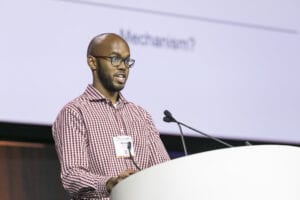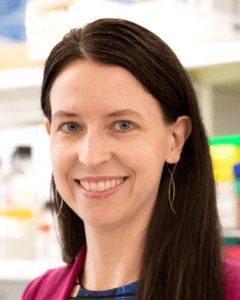Abstracts
Abstract submissions are now closed
 Abstract notifications were sent to authors on August 5. Start planning now by registering today. Programming confirmations will be available in mid-August.
Abstract notifications were sent to authors on August 5. Start planning now by registering today. Programming confirmations will be available in mid-August.
ASHG gratefully acknowledges the expertise, hard work, and dedication of the 2022 Abstract Reviewers.
Members and nonmembers are encouraged to submit their latest research for programming at the ASHG 2022 Annual Meeting. As a member benefit, there is no cost to submit. Thousands of abstracts will be accepted and programmed either as plenary/platform talks (oral presentations) or poster presentations.
By submitting an abstract, you will benefit from a creative, idea-generating environment by getting feedback from global experts, sparking ideas through conversation, and forging collaborations across institutions and disciplines. Speaking slots are prioritized for abstracts presenting exciting, mature work. Findings should be novel and represent a significant advance in the field. Submitting an abstract can also make you eligible for the Epstein Trainee Research Awards, Developing Country Awards, and the Human Genetics Scholars Initiative!
Check out our abstract guide video on YouTube for pointers and tips on how to plan, write, and format your abstract.
“Submitting an abstract is a great way to get noticed by your colleagues, build your career and experience, and meet collaborators across disciplines.”
– ASHG Program Committee Chair, Erica Davis, PhD
 Resources/Quick Links
Resources/Quick Links
Rules and Policies
Topics
Keywords
Step-by-Step Instructions
FAQs
ACCME Accreditation Requirements and Guidelines
Abstract Rules & Policies
- An individual may be first (presenting) author of only one abstract.
- The presenting author’s name should be the first name to appear in the author listing.
- The first (presenting) author must present the gene symbol and/or name the identified marker at the meeting if you are reporting the mapping, linkage, or association of a locus to a phenotype. Authors who do not conform to this policy at the meeting will be subject to sanctions as determined by the Program Committee.
- There is no limit to the number of times an individual may appear as co-author on abstracts.
- Co-authors do not receive communication related to the abstract.
Submitting authors will be asked to:
- I have read, understand, and agree to the Abstract Submission Rules and Meeting Policies, including Code of Conduct.
- I understand that in submitting an abstract, I am authorizing ASHG to contact me about its Annual Meeting, including the status of my abstract.
- I will submit only one abstract as first author. I understand I can only speak and moderate for one accepted proposal. This includes if I have been accepted as an invited session speaker.
- I understand that as first author, I must notify all authors of any and all correspondence relating to this abstract submission.
- I confirm that each co-author has been informed of this abstract submission and has agreed to all information as it was submitted.
- I verify that any reported human participants research was conducted with participants’ voluntary, informed consent, with approval by an appropriate research ethics committee, and consistent with the principles of research ethics, such as those described in the Declaration of Helsinki, and the Belmont Report.
- I am submitting this abstract with the intent of attending and presenting my work in person at the American Society of Human Genetics Annual Meeting being held October 25-29, 2022, in Los Angeles, California. I understand that if I do not register and attend in-person, my abstract may be withdrawn and my opportunity to present in Los Angeles forfeited. I understand that ASHG is not making any commitments to host virtual or hybrid content formats and reserves the right, at its sole discretion, to make adjustments to presentation format and style.
- Presenting Author Disclosure: If my abstract is accepted as a platform or plenary (oral) presentation, I understand that I must include a conflict-of-interest slide as part of my presentation and that I must provide verbal and written disclosures to attendees. I further understand and agree that ASHG’s joint provider for continuing medical education may review my presentation in advance of the presentation in advance of the presentation date. I understand that once slides are reviewed, they cannot be changed.
- Presenting Author Disclosure: If my abstract is accepted as a platform or plenary (oral) presentation, I agree to use generic names (i.e., non-branded names) in my presentation as much as possible. Specific products of ineligible companies will neither be promoted nor disparaged. The content of my presentation will not contain advertisements for a specific product, company, and/or service nor contain any logos of ineligible company. In addition, I agree to disclose on the required disclosure slide any unlabeled/unapproved uses of drugs or products referenced in my presentation/materials.
A major goal of the ASHG Annual Meeting is to showcase leading edge research that is new to the field and appears in an international forum for the first time. If the findings in this abstract submission have been or will be published elsewhere prior to June 9, 2022, authors should make clear what new information will be presented.
- It is the authors’ responsibility to update the submission concerning any acceptances that occur before the submission deadline of June 9.
- For abstracts that are previously published, authors are strongly encouraged to describe any advancement beyond published work that will be presented.
- At time of assigning platform talks, the Program Committee will independently verify whether there is a publication available with an acceptance date before June 9. Failure to disclose prior publication will result in abstracts being deprioritized for oral presentation in plenary or platform sessions.
For purposes of this policy, “previously published” means:
- Accepted for peer-reviewed publication, or
- Accepted for oral presentation at other conferences
Material posted on a preprint server is NOT considered previously published.
- ASHG endorses the protections embodied in the principles of the Declaration of Helsinki and the Belmont Report, and their expansion in the regulations governing research supported by the U.S. Government (45 CFR Part 46).
- ASHG does not endorse and will not publish the results of research that was not conducted in accordance with these principles.
- Investigations involving animals reported in abstracts must have been conducted in conformance with approved principles of the care and use of animals in research.
- Substitution of the first (presenting) author is not permitted. If substitution becomes necessary, you must inform ASHG by emailing meetings@ashg.org upon confirmation of your abstract acceptance.
- Authors who fail to notify ASHG that they cannot attend may not be invited to present at future meetings.
- A change to the author of a plenary or platform presentation requires prior written approval from the Program Committee Chair. Substitution is not allowed without prior written approval.
Abstract Review
After the June 9 deadline, abstracts will be reviewed by the Program Committee (PC), plus three independent reviewers for each topic category. The Committee programs abstracts as follows:
- Abstracts are reviewed to ensure they have been submitted to the correct topic category. If not, the abstract is moved to a more appropriate topic, where it can be reviewed by the appropriate experts.
- Each abstract is reviewed by four reviewers (one PC member and three independent reviewers).
- This review step is blinded and strictly confidential. Each reviewer scores the abstracts independently, without knowledge of the name(s) and institution(s) of the submitter(s) or the scores given by the other reviewers.
- In July, the Program Committee meets to assign abstracts to Plenary, Platform, and Poster Sessions based on the cumulative score as well as the impact of the science and the balance of topics for ASHG’s multi-disciplinary audience.
- The top-scoring abstracts are considered for inclusion in the Plenary Sessions.
- Approximately 250 abstracts are selected for oral, Platform Sessions. The majority of Platform Sessions are organized around specific themes and are intended to be focused, cohesive, and informative. When possible, the Program Committee will also design multi-disciplinary and/or cross-topic sessions.
- The remaining accepted abstracts are assigned to posters, and the top-scoring poster abstracts are awarded the Reviewers’ Choice designation. A subset of the Reviewers’ Choice is highlighted during the Poster Talks.
- The Program Committee reserves the right to decline a presentation to any submitted abstracts that lack scientific content or merit, or that merely announce the availability of a resource or service.
- Abstract acceptance notifications will be sent to authors in August. Abstracts are programmed into the following session types:
- Featured Plenary Abstract Talks
- Concurrent Platform (Oral) Sessions
- Poster Sessions
- Reviewer’s Choice Recognition
- Poster Talks
First (presenting) authors are expected to register and attend the ASHG 2022 Annual Meeting. Substitution of the first (presenting) author in platform and plenary presentations requires prior written approval from the Program Committee Chair.
Accepted abstracts will be available on September 8, 2022. At this time, your abstract and all information will become a matter of public record and may be referenced by ASHG, media relations staff, and others. The following is a suggested style for citing ASHG Meeting abstracts:
Example Only
Simpson R.S., Barnes P., Disruption of the microRNA pathway; (Abstract/Program #X). Presented at the Annual Meeting of The American Society of Human Genetics, Date, Location, (e.g., October 26, 2022, in Los Angeles, California)
Authors of submitted abstracts agreed to the American Society of Human Genetics licensing agreement/copyright policy:
The author grants ASHG a nonexclusive, perpetual, worldwide license to copy, reproduce and publish the abstract in ASHG’s online or print publication of ASHG abstracts and/or other compilations or collective works to be assembled and owned by ASHG (together, “Collective Works”) in any form or medium now existing or hereafter created throughout the world. The submitting author understands and agrees that ASHG shall own all rights, including copyright, in and to the Collective Works including the right to:
- Distribute, reproduce, license, display, perform, lend, lease, or transfer rights to the Collective Works to third parties,
- Prepare derivative works of the Collective Works, and
- Register the Collective Works in ASHGs own name with the U.S. Copyright Office.
It is understood that the submitting author and/or third parties with copyrights shall retain copyright in and to the abstract contributed by the submitting author to a Collective Work. The submitting author affirms that he/she is the author and owner of the abstract and holds all copyrights in and to the abstract, or has secured any third party permissions necessary to grant ASHG the above rights. The submitting author is responsible for providing any related third party with a copy of this grant of rights.
NOTE: The submitting author has copyright to the individual abstract, so permission to use material derived from the abstract (other than citation) must be obtained from that author.
ASHG aims to encourage presentation of the latest findings and enable responsible and quality reporting of those findings by press in attendance. To this end, all abstracts, posters, presentations, symposia, and scientific and invited sessions at the ASHG Annual Meeting will be embargoed until the date and start time of their presentation at the meeting. This means that press registrants may not publish any information about work being presented at the meeting until the date and start time of the presentation. This policy helps ensure that all reporters have access to the same, up-to-date and complete information when researching and writing their articles.
Questions? meetings@ashg.org



